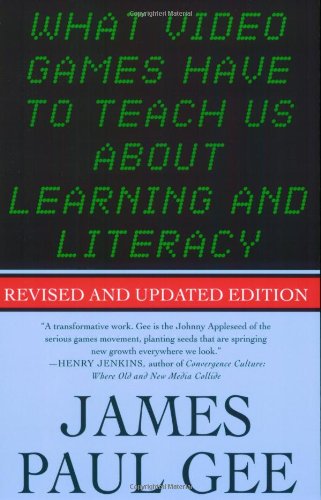What Video Games Have to Teach Us About Learning and Literacy
Synopsis
This synopsis will contain spoilers!
Gee argues in this book that good video games are very good at teaching the player a wide variety of skill necessary to complete the game. Furthermore, Gee claims, considering how difficult, long, and frustrating games can be, perhaps there are techniques games use to teach that could apply to all types of learning.
Throughout the book, he presents 36 principals that are relevant both to learning in video games and to learning as a whole. I will not present all 36 here, because they are succinctly and clearly summarized at the end of the book, and it is worth simply referencing them there. However, I will summarize a few of the major themes that are prevalent in many of the principles.
Learning is most effective when it is embodied, or situated, in the subject that is being learned. This is opposed to a skill and drill technique of teaching that would emphasize memorization. Video games, however, are nothing but embodied learning experiences. Moreover, the networked, embodied, social learning environment that video games create (or that exist around them) are more attuned to the actual workforce that awaits students after school. Thus, in many ways, video games are better preparing students for life after school than the school itself is.
Gee does not mean for this book to be a call for everyone to play video games, or for games to be used in teaching curriculum. Instead, he simply wants to take the lessons video games teach us about learning, and apply those to the modern school system.
For more evidence in support of Gee's argument, please see the book. I would have to spend dozens of pages to summarize the support he offers for each learning principle.
Reviews
- What Video Games Have to Teach Us About Learning and Literacy - Paperback
I probably shouldn't have been, but I admit I was surprised when I realized (about 20 or 30 pages in) that Gee wasn't going to be an apologist for video …
- Dec. 17, 2009
Quotes
"[G]ood video games build into their very designs good learning principles and ... we should use these principles, with or without games, in schools, workplaces, and other learning sites."
James Paul Gee in What Video Games Have to Teach Us About Learning and Literacy
"I want to talk about video games - yes, even violent video games - and say some positive things about them."
James Paul Gee the First Line of What Video Games Have to Teach Us About Learning and Literacy
"I may well have learned more by writing this book than anyone has by reading it."
James Paul Gee the Last Line of in What Video Games Have to Teach Us About Learning and Literacy
-

-
Originally Published Jan. 1, 2007
Paperback edition:
219 pages - Dec. 1, 2007